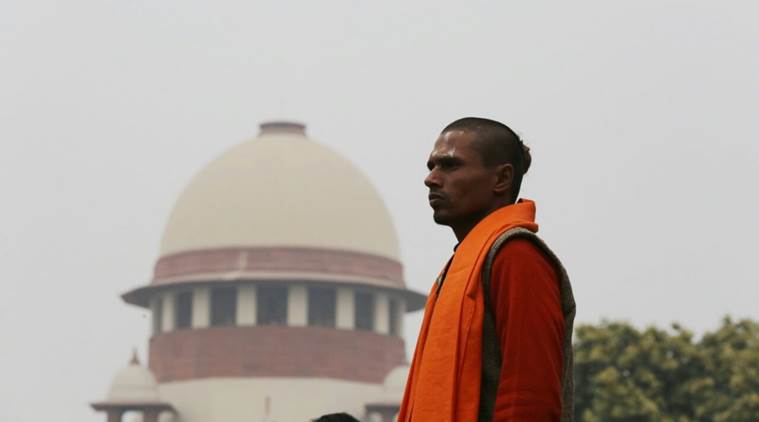
Questioning the contention that Muslims had not offered prayers at Babri Masjid except on Fridays after 1934, one of the appellants in the Ayodhya dispute told Supreme Court on Tuesday that this was because they were not allowed to.
“Hindus say they (Muslims) didn’t pray there after 1934… and a virtue is made out of that… It’s because you didn’t let them pray. And then you say limitation comes in,” Senior Advocate Rajeev Dhavan, appearing for M Siddiq, told a five-judge Constitution bench headed by CJI Ranjan Gogoi.
The bench, also comprising Justices S A Bobde, D Y Chandrachud, Ashok Bhushan and S A Nazeer, is hearing appeals against the September 30, 2010 verdict of Allahabad High Court which made way for a three-way division of the disputed 2.77 acres.
Read | Ayodhya land dispute case: Babri litigant alleges bid to assault, death threat to withdraw case
Justice Bobde asked Dhavan, “…was there any action taken by any Muslim who went there and said, ‘I’m not being allowed to pray’?”
Dhavan replied that the Wakf inspector had given a report, which he said showed Muslims prayed in the inner courtyard only on Fridays. He said although the key was with the Muslims, the police allowed the mosque to be opened only on Fridays, when it was cleaned and prayers were offered.
The bench asked whether the witness, who claimed that Muslims were not allowed to pray, was cross-examined. Dhavan replied, “We are only [concerned] on the veracity of the statement of the witness.”
Reiterating the assertion that idols of Hindu deities were placed inside the central dome of Babri Masjid on the intervening night of December 22 and 23, 1949, Dhavan contended that the “sequence of events” showed it was a “planned, surreptitious attack”.
While those supporting the temple contend that idols “appeared” on their own — “swayambhoo” — Dhavan said, “Appearance of idols of deities inside Babri was not a miracle. It was a planned and surreptitious attack.”
Accusing then Faizabad District Magistrate K K Nair of playing a role in the “conspiracy”, Dhavan said Nair later contested the Lok Sabha polls for Bharatiya Jan Sangh, the precursor to BJP.
Dhavan also said the temple side’s claim to the entire area, and not just the spot referred to as Janmasthan was based on the “swayambhoo” argument. If the court accepts the swayambhoo argument, he argued, Muslims get nothing.
On this, Justice Chandrachud asked, “When a place assumes the character of a juridical person by virtue of birth of a deity or marriage of a deity, then wouldn’t areas abutting the spot where the garlands were exchanged also become part of it?”.
Dhavan replied, “That’s assuming Muslims were not praying there.”
SC notice on ‘threat’ to Rajeev Dhavan
The apex court on Tuesday issued notice to one N Shanmugham, a Chennai-based octogenarian professor, on a plea by Rajeev Dhavan, alleging threats for representing the Muslim parties. In his complaint, Dhavan also attached a WhatsApp message that he received from another person.